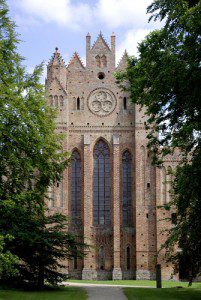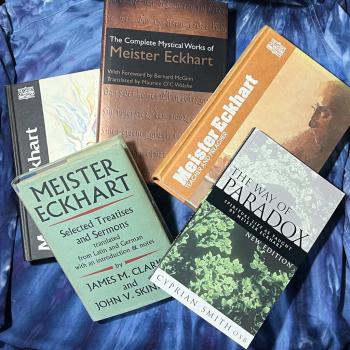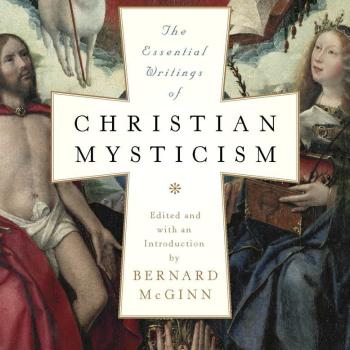A reader of this blog named Chris writes:
I have been studying the German medieval mystics and I am strangely drawn to them. My ancestry is strongly German and my historical spiritual roots are there. Does God encode us with a certain kind of spiritual mystical DNA? I can’t help but wonder if Christian mysticism runs in my family and ancenstry?
Chris, thank you for your question. For me it immediately brings to mind the Star Wars myth, where Luke Skywalker learns that his strength in The Force was something he inherited — alas, from a father who had turned to the dark side! And I don’t want to give away any spoiler for the few people who still haven’t seen The Force Awakens, but let’s just say that this theme remains important in the latest Star Wars movie as well.

We see this kind of ancestral talent all the time. Pushing the Star Wars analogy, Carrie Fisher (Princess Leia) is the daughter of legendary actress Debbie Reynolds — and the mother of Billie Lourd, also an actress. Or look at musicians: Woody and Arlo Guthrie; Johnny and Roseanne Cash; Hank Williams Senior and Junior; Johann Sebastian Bach and Carl Philip Emmanuel Bach… to name just a few.
So Chris, your question makes a kind of intuitive sense. Why wouldn’t mystical ability be passed down from generation to generation, just like musical talent or artistic sensibility?
With that in mind, my answer to your question is “I suppose so.”
Now, that may not seem very strong of a reply, and that’s because there are some things to consider.
First of all, nearly all of the great mystics of the past were celibate. They were monks and nuns. Of course, even monks and nuns might have children (some, like St. Augustine and Thomas Merton, had children before entering religious life; and we can’t discount the possibility of illicit liaisons, although hopefully most mystics would have had the integrity to avoid that kind of situation). But when you consider how many monastics in the past entered the cloister at a very young age (Hildegard of Bingen, one of the great German mystics, entered religious life when she was still a child, no more than 14 years old), it’s obvious that, for the most part, most Christian mystics did not have children.
But I think just as important is this consideration: mysticism is not a skill or a talent. When we look at the mystics over 2000 years of Christian history, one reality that we see is that mystics come in many shapes or sizes. Some are visionaries, but many aren’t. Some are more philosophical/intellectual in their writing, others more devotional or “heart centered” in their approach. Some — many — are great saints, but more than a few suffered condemnation as heretics (including arguably the greatest of German mystics, Meister Eckhart). Some are great literary figures, writing classic autobiographies or luminous poetry. Others are known for their profound sense of union or communion with God. And on it goes. As the Carmelite friar William McNamara put it, “The mystic is not a special kind of person; every person is a special kind of mystic.” In other words, even if we could establish some sort of DNA or genetic link between mystics, it might not matter very much, since each mystic represents a unique expression of the Divine-human encounter.
I’m not saying that there is no chance that your interest in the mystical life is related to your DNA, Chris. It could be. But I think a closer connection could be found not within your genes, but from your name. I’ll make the assumption (correct me if I’m wrong) that your name is short for “Christopher.” As you may know, Christopher literally means Christ-bearer. What a lovely name. And something that we are all called to do.
You see, I believe that the root of contemplation, or mysticism, or spiritual insight, is always the same: it’s Christ (I’m speaking as a Christian here, but as a Christian I believe Christ is the source of all light and truth, even when it is received by other names among those who follow different religions). To be a Christian mystic means to be in a loving relationship with Christ — to respond to Christ’s love, Christ’s call, Christ’s gift of mystical insight or Divine union.
This is not to say that our identity or even our cellular memory has no place to play in the spiritual life. Christ, after all, meets us where we are. Even though I am now a Catholic, for many years I was an Episcopalian, and to this day I have a particular affinity for English mystics. That’s who I am, and I believe God meets me in the middle of my interests, my longing, my desire, to invite me to become the person I am uniquely called to be.
And that is perhaps my final thought. Let’s say that your mystical impulse, Chris, really is the result of you carrying a “mystical gene.” Even if that’s the case, the question facing you now is, “What are you going to do about it?” God is not calling you to be another Hildegard, or Eckhart, or whomever. God is calling you to be Chris. Your expression of contemplative and mystical response to the love of God will be unique for all eternity. It’s yours, and yours alone. Each person is a special kind of mystic. You are invited to discover for yourself just what your unique expression of mysticism looks like.
I hope this is helpful. Blessings on you as you continue your journey. Thanks for writing.
If you have a question about Christian contemplation, mysticism, interfaith dialogue, or silent prayer, please use the contact form to share your question with me. I may use it in a future blog post.
Enjoy reading this blog?
Click here to become a patron.














